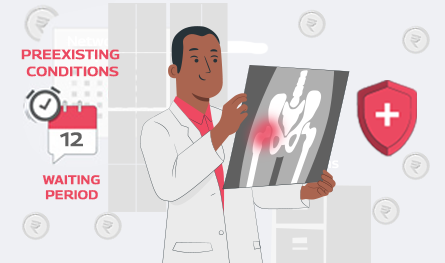Related Articles
 Jan 08, 2025
Jan 08, 2025
Is Varicose Vein surgery covered under the health insurance policy in India
 Health Insurance
Health Insurance

A health insurance plan is designed to offer coverage for different types of medical needs of the insured. However, when it comes to health insurance for pre-existing diseases, finding the right plan becomes tricky. This is simply because most health insurance companies require certain prerequisites to offer coverage for pre-existing conditions. Let’s learn about exclusions in health insurance for pre-existing diseases in detail.

A pre-existing disease is a condition that the policyholder has been experiencing before applying for a health insurance plan. Some common examples of such diseases are asthma, thyroid disease, diabetes, and high blood pressure. Any diagnosis made within 48 months before purchasing the health insurance is considered a pre-existing condition. Such conditions are a part of exclusions in health insurance, at least for a time period.
When applying for health insurance, the insurance company assesses the applicant's health conditions, and if a pre-existing disease is found, the coverage, premium, and waiting periods are determined accordingly.
Purchasing a health insurance plan for a pre-existing condition is challenging primarily due to the waiting period. A waiting period for pre-existing diseases is the duration that the policyholder must wait before becoming eligible to raise any claims or utilise the benefits under the health insurance plan.
The waiting period is calculated from the date of policy issuance and ends according to the respective health insurance company's guidelines.
Let’s take a quick look at the types of waiting period:
The waiting period for pre-existing diseases is the duration that the policyholder must wait before raising any claims if, before applying for the health insurance, the policyholder has certain pre-existing diseases, such as diabetes or high blood pressure. Simply put, such exclusions in health insurance come with a waiting period.
An initial waiting period is the duration that every policyholder must wait before filing any claim.
Every health insurance company has a list of named ailments or procedures, like cataracts or joint replacement, etc. To raise a claim for such procedures, the policyholder has to wait for a specific duration.
At the time of applying for a health insurance plan, applicants with pre-existing conditions often find themselves tempted to hide this information from the health insurance company to avoid paying higher premiums or facing exclusions during the waiting period.
Remember that hiding such information can lead to the rejection of claims in the future or the revocation of the policy itself.
Health insurance companies ask applicants to disclose critical health information to ensure they develop the best available plan and coverage. Even if policyholders might find themselves paying a slightly higher premium or facing exclusions during the waiting period, in the long run, disclosing the right information can help them with quick claim settlement.
If you are purchasing a health insurance plan for a pre-existing disease, then there are a few considerations that you must bear in mind:
First, it is essential to undergo a health checkup to identify any pre-existing conditions.
When purchasing your health insurance plan, be sure to disclose accurate information about your health conditions. Hiding such critical information can lead to rejection of your claim in future.
Health insurance companies typically have specified waiting periods for different pre-existing conditions that you must carefully evaluate and compare.
Did you know that the IRDAI has reduced the waiting period for pre-existing diseases from 4 years to 3 years?
Most health insurance companies charge a slightly higher premium if the policyholder has any pre-existing medical conditions. However, you can compare different policies and pick the one that offers coverage at an affordable premium.

Paybima Team
Paybima is an Indian insurance aggregator on a mission to make insurance simple for people. Paybima is the Digital arm of the already established and trusted Mahindra Insurance Brokers Ltd., a reputed name in the insurance broking industry with 17 years of experience. Paybima promises you the easy-to-access online platform to buy insurance policies, and also extend their unrelented assistance with all your policy related queries and services.

Let’s be honest, your health does not come with a warning sign. One moment you are enjoying your breakfast, and maybe in the next, you're staring at a hospital bill that looks like a phone number. This is why having solid medical insurance is not a luxury anymore. It is your financial shield, your plan B, and your peace of mind, all rolled into one.

Choosing a health insurance plan isn’t just about ticking boxes or going for the one with the flashiest brochure. It’s about finding something that works for you, this means your age, your health concerns, your hospital preferences, and yes, even your peace of mind. Whether you're in your 30s, planning for the future or exploring options for a parent who needs extra medical attention, a good policy should feel like a safety net, not a maze of fine print.

Your health deserves more than just a generic insurance tick, because unexpected illnesses or hospital stays can hit at any time. When you’re sorting through policy choices, remember this: you’re not buying paperwork. You’re investing in security for yourself and your loved ones. That means you want clarity, affordability, and features that fit your lifestyle, not just the prettiest brochure.

You’ve made it to a time in your life when "adulting" isn’t just managing office breaks or trying to check in with your old friends. It’s about making smart choices that give you peace of mind. And one of those choices is securing a solid health insurance policy. Whether you're worried about rising medical costs, long hospital stays, or simply want backup for emergencies, picking the right medical insurance plan matters.

You never plan to fall sick, but life often has its plans. One moment you’re binge-watching your favourite series, and the next, you're on a hospital bed discussing room types and co-payments. In times like these, comprehensive health insurance steps in like your personal superhero.
